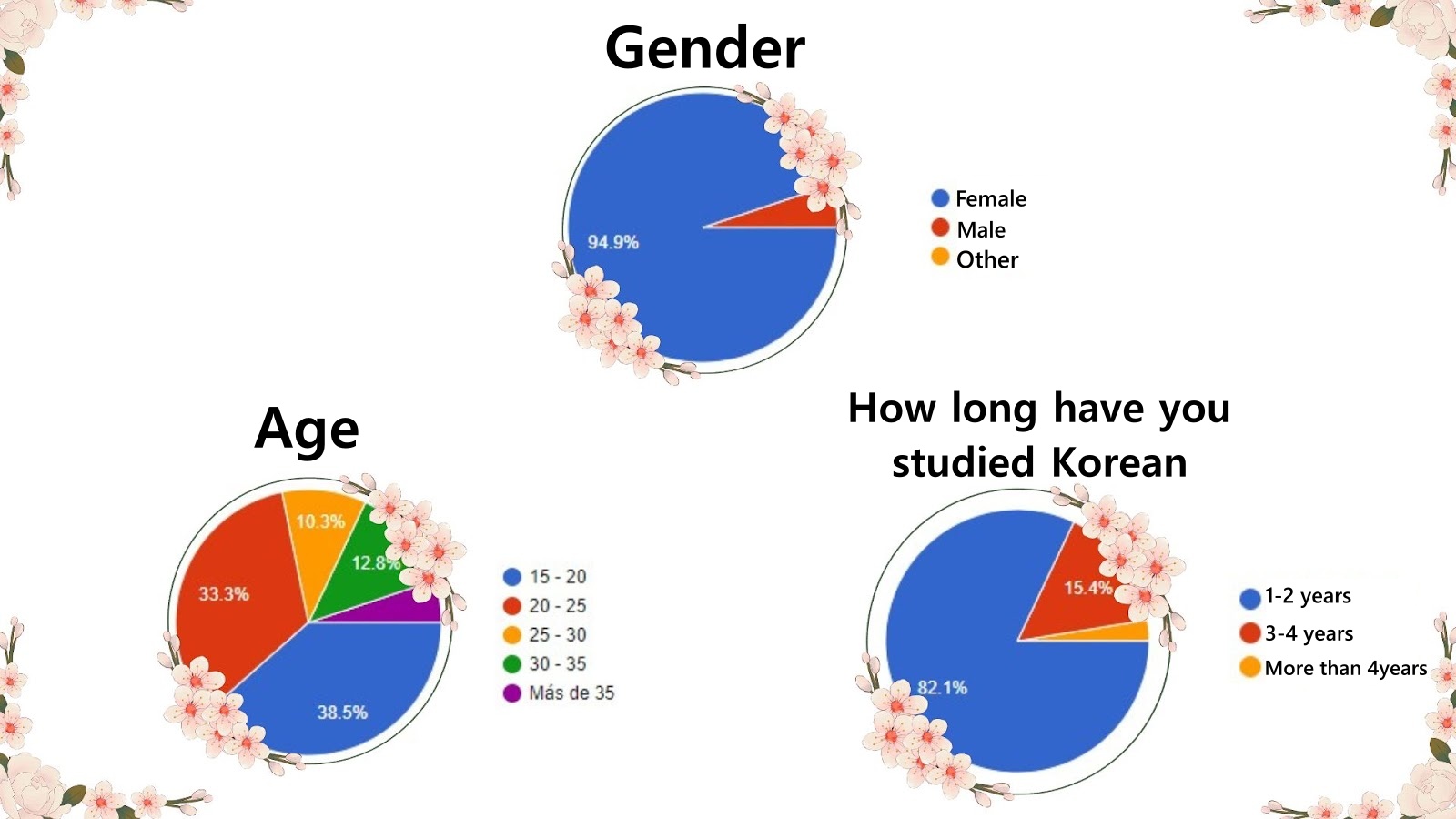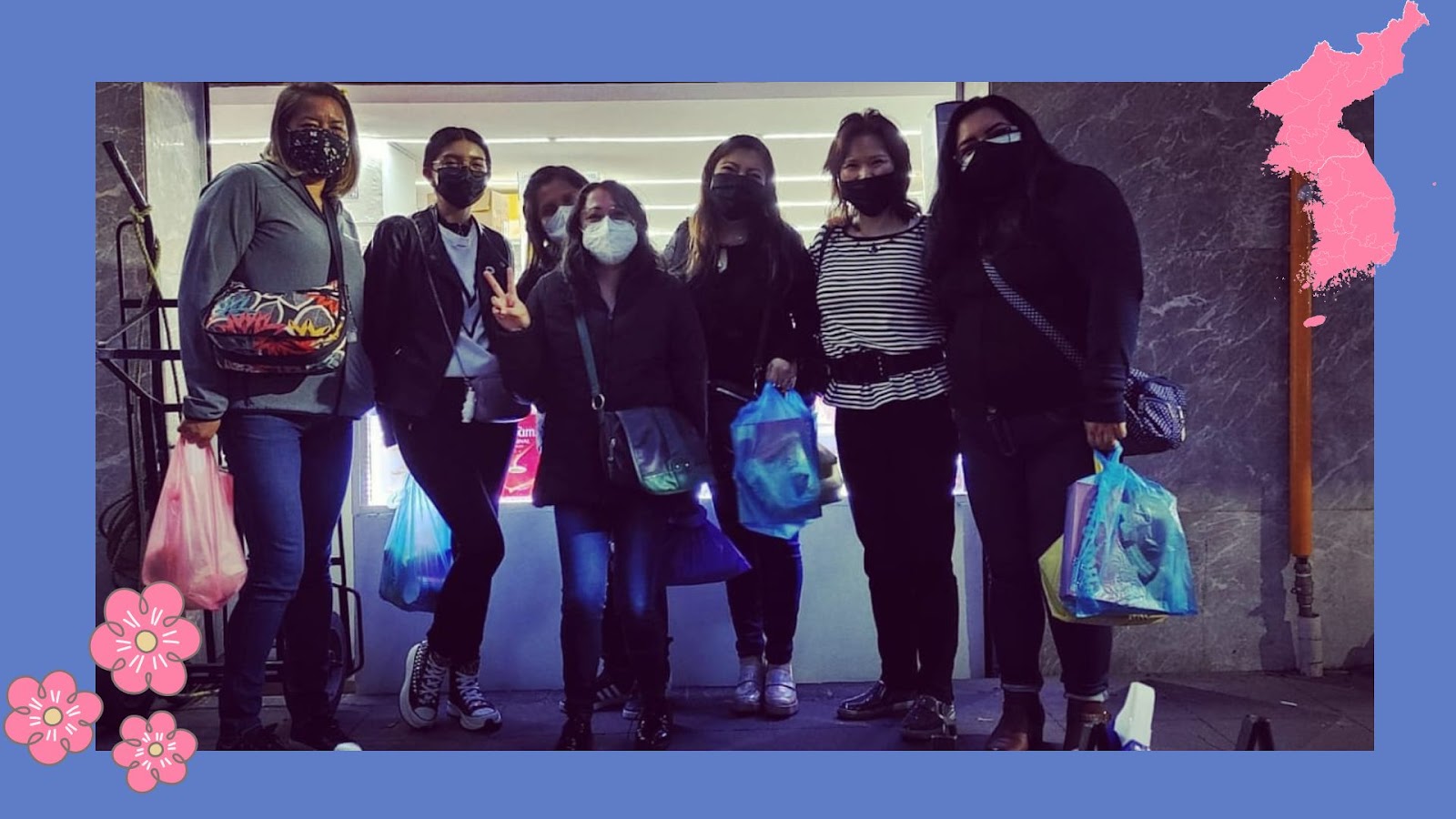- 한국어
- English
- 日本語
- 中文
- العربية
- Español
- Français
- Deutsch
- Pусский
- Tiếng Việt
- Indonesian
By Honorary Reporter Karla Chavez Camargo and Veronica Zuniga Perez from Mexico
Photos = Karla Chavez
Oct. 9 marks Hangeul Day in Korea. With the growing popularity of all things Korean abroad, demand for Korean-language education has consequently soared. This article is a summary of the experiences of 39 Korean-language students we surveyed in Mexico from Oct. 1 to 5 and our own.
Survey results

The two writers conducted a survey of 39 Mexican students of Korean.
The graphs show that 94.9% of the students were female and just 5.1% male, with 71.8% being in the age range of 15-25. The majority (82.1%) said they had studied Korean for one to two years, which made us believe that the use of online platforms for Korean-language education due to COVID-19 widened access to the study of Korean.
On the question "Why did you decide to study Korean?" the answers included attraction to Korean culture, studying an interesting language, interest in traveling or studying in Korea and K-pop. Another question, "What is your ultimate goal after taking Korean-language classes?" had a range of answers such as taking the Test of Proficiency in Korean, visiting, studying and working in Korea, dubbing and subtitling Korean-language content into Spanish, boosting Korea-Mexico relations, viewing or listening to Korean content without interpretation or subtitles and pursuing careers as teachers of the language.
What was most difficult for students was memorizing Korean vocabulary and grammar, while they found writing Hangeul easier. Techniques used to improve Korean included keeping a daily diary in Korean and placing stickers on household objects with their names in Korean.
Korean ranks 16th among the world's most spoken languages with around 78 million people using it. Thus learning the language could lead to opportunities as an interpreter or translator or in the technology or entertainment industries.
My experience studying Korean (Zuniga)
My first experience in learning Korean was through a K-drama, and my interest eventually expanded to Korean culture, gastronomy, K-pop and cinema. So in 2014, I decided to visit Korea to enroll in a private course with a Korean teacher. Korean pronunciation and structure were very difficult for me at first but my trip to Korea greatly enhanced my language skills.
After returning to Mexico, I studied Korean again in 2017 at an academy with a teacher of Korean specializing in linguistics. My progress was constant and I attended classes for 1 1/2 years. The next year, my friends wanted to travel to Korea with me as tourists. And thanks to my knowledge of the language, I worked a volunteer at a summer camp in Korea.

This dinner in 2017 was held after the end of a Korean-language course.
My alma mater, the National Polytechnic Institute (NPI), this year launched a Korean-language course. Because of my involvement in Korean culture, they invited me to collaborate in this project. Thanks to the great response of NPI students, Korean will soon be incorporated into other foreign language centers at the university.
My experience learning Korean (Chavez)
In 2016, I was an exchange student in Ireland and two of my closest friends were Korean. Because of them, I began to read more about Korea. In 2018, I started studying Korean to understand and sing along with K-pop songs, and I later decided to pursue a master's degree in Korea.
For a year, I studied the language on my own. In 2019, I enrolled in classes at the Korean Cultural Center in my city because I had no opportunity to speak Korean with a native speaker who could correct mistakes and help improve my ability to communicate. I also bought more materials to learn Korean.

These are among the textbooks one of the authors used to learn Korean.
Finally, I enrolled this year at an academy with two teachers at each level -- one Mexican and one Korean -- and thus my understanding has developed faster.
Studying Korean has allowed me to connect with people on social networks, form new friendships and collaborate with Koreans. And knowing the language has also granted me opportunities to do volunteer work related to Korea.
enny0611@korea.kr
*This article is written by a Korea.net Honorary Reporter. Our group of Honorary Reporters are from all around the world, and they share with Korea.net their love and passion for all things Korean.
Most popular
- Grammy-winning producer calls Suga of BTS 'amazing artist'
- Animated 'KPop Demon Hunters' tops Netflix charts in 41 markets
- 'Squid Game' events to pump up K-Content Seoul Travel Week
- Reunited BLACKPINK releases video preview of world tour
- 'Universal love, family' themes fuel success of 'King of Kings': director
